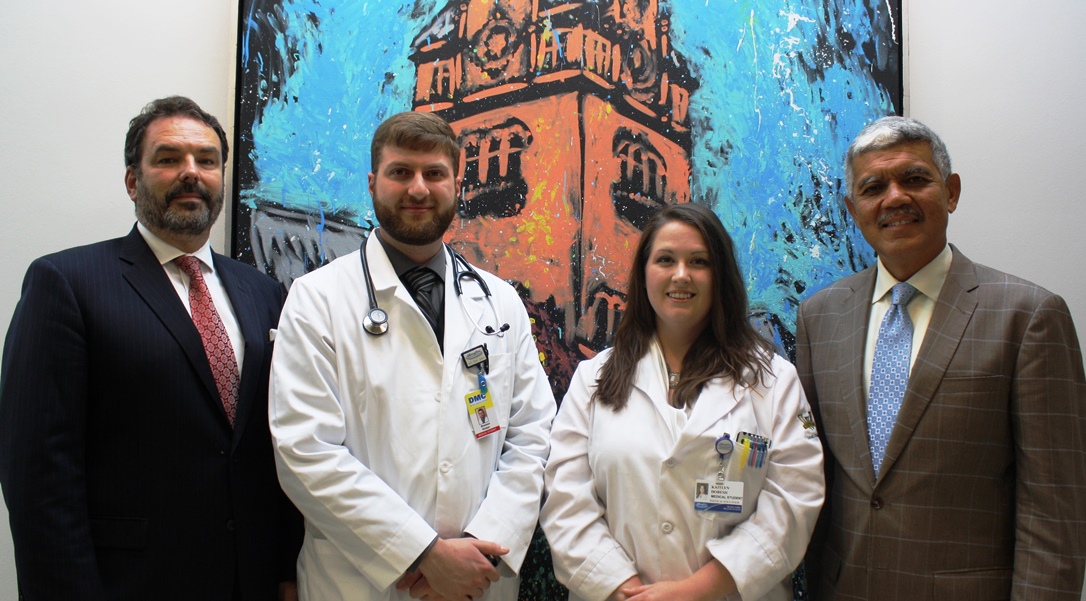
Pictured from left are Mark Juzych, M.D., Brenton Kinker, J.D., Kaitlyn Dobesh, J.D., and M. Roy Wilson, M.D.
Wayne State University School of Medicine students Brenton Kinker, J.D., and Kaitlyn Dobesh, J.D., can now list WSU President M. Roy Wilson among their academic colleagues after co-writing an article with him for the American Journal of Ophthalmology.
Dr. Wilson, an Ophthalmologist and chair-elect of the Association of American Medical Colleges Board of Directors, contributed to "The Impact of the Medicare Access and CHIP Reauthorization Act on the Field of Ophthalmology," published Aug. 31. WSU Department of Ophthalmology Chair Mark Juzych, M.D., '89, and Kresge Eye Institute Research Coordinator Nariman Nassiri also contributed to the paper, which interprets the changes being made to the reimbursement structure for Medicare.
"It accounts for a significant amount of health care payments in the United States. Most third-party payers take their cues from Medicare, so changes on the federal level have a significant impact," Dobesh said, a member of the M.D. Class of 2019.
Both students are attorneys and active members of the American Medical Association's student section, specifically participating in health care policy legislature.
"This project was originally Brenton's brain child," Dobesh said. "Our involvement with the AMA has kept us abreast of changes in health care policy, including the reimbursement structure. We were both following the passage of MACRA and how the Center for Medicare and Medicaid Services was going to implement it. Our previous experience in the law made it an issue we were both deeply interested in, especially since it will likely have a significant impact on both of our careers, as well as the medical field as a whole."
Kinker spent the summer of his first year as a summer intern at Kresge Eye Institute in Detroit.
"I learned a lot about the field of Ophthalmology there, and had some interest in pursuing it. Probably even more importantly, I had more clinical exposure in Ophthalmology than any other field of medicine when the idea for the paper hit," he said. "The practices of Ophthalmologists, in particular their specialist fields, are very different from the primary care physicians who we target most of our legislation to. What makes sense for one group will not necessarily make sense for the other."
They didn't realize the high-level interest the project idea would garner though.
"We were presented with the opportunity to work with Dr. Juzych and Dr. Nassiri through Kresge and Dr. Wilson, an Ophthalmologist by training, on the project. Having such experienced physicians and researchers on the project, combined with our legal expertise, made it a very exciting opportunity to really take a deeper look into how this policy was going to affect the field of Ophthalmology," Dobesh said.
They reviewed the use of two payment structures - Merit-Based Incentive Payment Systems, or MIPS, and Alternative Payment Models, or APMs. Both focus on bundling payments and reimbursing based on "fee-for-service-plus" models, which take into account clinical outcomes, coordination of care, clinical improvement and electronic information exchange and security. APMs have substantial advantages, the authors wrote, with participants receiving a bonus and a higher rate of annual adjustment over the program's life. They concluded though that Ophthalmologists will likely use MIPS because of its broader applicability and the current paucity of APMs for Ophthalmologists, but its comparatively lower reimbursements, cost, quality and other reporting measures could be problematic.
Kinker, a fourth-year medical student, combed through thousands of pages of documentation and comments regarding the Medicare Access and CHIP Reauthorization Act of 2015, or MACRA, to get a base understanding of the reimbursement change structures. Due to the journal's tight deadline, they had less than a month to complete the research, write and edit the manuscript.
The duo thanked attorney Julie Clement, a former faculty member of the Western Michigan University law school for her help with punctuation and grammar.